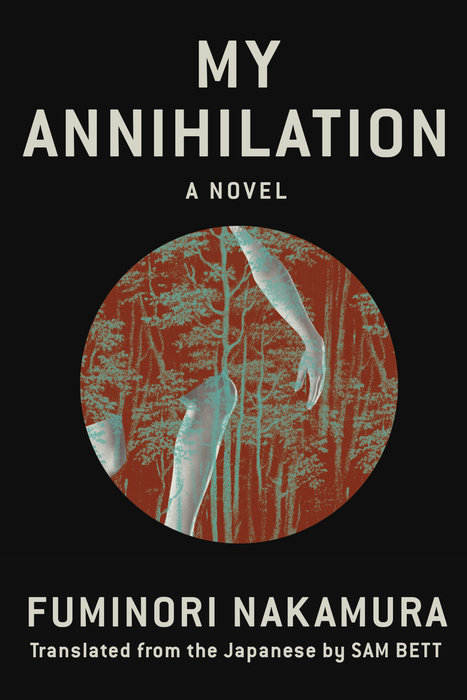
Literary noir maestro Fuminori Nakamura has always been interested in understanding the psychology of crime, and in My Annihilation he allows that obsession to shape the entire narrative. The result is a dark novel that’s the literary equivalent of a puzzle box; an experimental, relentlessly cerebral story in which every narrator is unreliable, memories are tampered with, and reality is as shifting as points of view.
My Annihilation starts with an unnamed narrator hiding in a room as he prepares to leave his life behind and steal the identity of a man named Ryodai Kozuka. He is alone in the room, but there is a manuscript sitting in the corner and a suitcase that contains the body of a dead woman. The man opens the manuscript and the first line turns into a warning that sets the tone for what follows: “Turn this page, and you may give up your entire life.” The manuscript, whish the man assumes was written by Kozuka, chronicles the life of a narrator that pushed his sister off a cliff at a young age and the lingering psychological damage the act inflected on him and follows him through his rough childhood and into adolescence, which he spent listening to strange men beat his mother and then having sex with her. The memoir ends there, but the manuscript doesn’t. As the narrator reads on, he learns of Tsutomu Miyazaki, a real serial killer who murdered and subsequently molested and then ate four girls in the 1980s. Then, a stranger appears at the room’s door and takes away the man now pretending to by Ryodai Kozuka to a psychiatric hospital where he speaks with a doctor about psychiatry, the past, and a woman…and the narrative becomes too convoluted to offer a linear synopsis.
Nakamura has never evaded weirdness in his work, but here he fully embraces it. The narrative in My Annihilation moves around, jumps from past to present time and again, and delves into the lives of several characters, including real murderers. However, being able to follow everything perfectly is clearly not the point of this novel. My Annihilation is an exploration of the psyche, how trauma shapes individuals, and how dark desires can easily turn people into murderers. While there are many characters, the central role is occupied by the human mind and how it works, and Nakamura clearly did his research and has a good understanding of what compels people to act certain ways:
The endogenous opioids secreted by our brain to quell our terror and discomfort have been known to be released, in certain cases, at such levels that a person can essentially become addicted to the solace they provide. In some cases, they can even provide the solace of having dodged a crisis.
While this is a novel about ideas that ponders what happens when psychiatrists try to change their patients’ memories and how trauma can hide in the brain and eventually shape a child into an adult with violent or suicidal tendencies, it is also a crime novel in that it looks at the way crimes affect individuals. The woman who the narrator falls for, for example, had a horrible past—she was a woman who had had “a druggie dad and a drunk mom, who was sexually assaulted by her stepfather, and found her mom’s dead body after she committed suicide”—and her eventual death is directly tied to everything she experienced. When the narrator finds himself in love with her, his patient, both of their lives begin to spiral, and so does her treatment as he tries to use ECT to replace the her most brutal memories of abuse. Falling for her patient is something the narrator sees as somewhat acceptable, and it eventually makes him wonder is love truly exists:
Psychoanalysis is particularly fraught with cases where the psychiatrist and the patient spiral into romance. To give a simplified example, a patient who feels deprived of love from their father may, over the course of treatment, come to see the doctor as a father and attempt to garner love from him. The patient is encouraged to project a variety of important figures from their life onto the doctor. In order to respond, the doctor enters the framework that the patient has established, though working cautiously to keep their distance from the patient. However, like the celebrated analyst Jung—who had sexual relations with a large number of his patients—many fall into the same trap. Was this a romance, or a psychiatric phenomenon common to this sort of case? Or supposing it wasn’t love, does real love exist? At this point, it’s beyond me to say.
My Annihilation is a dark, obsessive, bizarre novel that’s hard to follow and in which nothing and no one can be trusted. However, it is also a wildly entertaining narrative in which things like abuse, grief, murder, and vengeance are seen through the lens of psychoanalysis. Nakamura is a gifted storyteller, and this fast, slim, cerebral noir, beautifully translated by Sam Bett, is a great addition to his oeuvre, which Soho Crime has brought in its entirety to English-speaking readers.
***
My Annihilation
by Fuminori Nakamura; translated by Sam Bett
Soho Crime; 264 p.
Follow Vol. 1 Brooklyn on Twitter, Facebook, and sign up for our mailing list.
